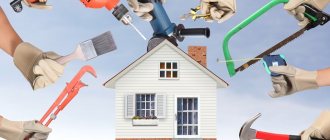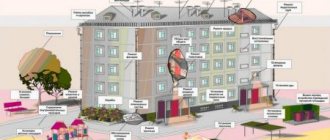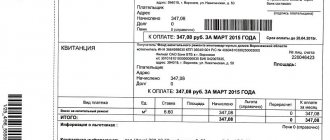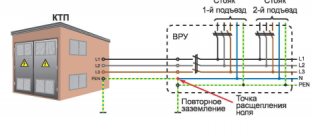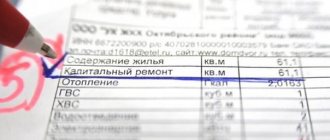Owners of premises in an apartment building bear the burden of maintaining the premises they own, as well as the common property of the house, and are required to pay monthly contributions for major repairs. By virtue of Article 155 of the Housing Code of the Russian Federation, property owners who have lately or not fully paid contributions for capital repairs are required to pay a penalty to the capital repair fund in the amount of 1/300 of the key rate of the Central Bank for each day of delay.
In accordance with paragraph 1 of Article 330 of the Civil Code of the Russian Federation, a penalty (fine, penalty) is a sum of money determined by law or contract, which the debtor is obliged to pay to the creditor in the event of non-fulfillment or improper fulfillment of an obligation, in particular, in the case of delay in fulfillment. A penalty is one of the ways to ensure the fulfillment of obligations, a means of compensating for the creditor's losses caused by the debtor's violation of his obligations.
The capital repair program - what is the essence?
The capital repair program is aimed at carrying out the necessary repairs to apartment buildings at the expense of their residents.
Everyone pays a monthly contribution for major repairs in the amount strictly established by the tariff. The funds raised will be used to restore systems and parts of buildings.
Residents were completely confused as the program was introduced unexpectedly. There were many doubts about its legality. Many appealed to higher authorities with complaints and refused to pay for non-existent repair work.
But the program was recognized at the judicial level as constitutional. It operates to this day, tens of thousands of houses have been repaired.
Reasons for introducing the program
- Why should residents themselves pay for home repairs? Why can't the government take on this responsibility?
The reason for introducing this program is very simple: most residential buildings have been privatized over the past ten years. This means that the buildings were transferred into the hands of private individuals. Consequently, repairs and restoration work should be carried out by the owner, and not the state.
But there are also those houses that belong to the government. Therefore, such houses are not covered by the program. Necessary restoration operations are paid for by the state.
Payment amount
The amount of payments is set by the responsible authorities. This could be a management company, the administration of a subject, etc.
The tariff depends on the following factors:
- Region.
- Age and condition of the building.
- Number of apartments in the building.
- Total area of apartments.
A certain amount is established for each square meter. Depending on the size of the apartments, the tenant pays his own fee for major repairs.
Distribution of funds
All payments are accumulated in the accounts of the responsible authorities. They can be spent on repairs and restoration of the following parts of the house:
- Roof.
- Facade.
- Engineering systems.
- Foundation.
- Cellars.
- Storage rooms.
- Metering devices, etc.
Both repair and replacement of all the above components of residential buildings can be carried out.
Legality of penalties
The concept of “penalties” first began to be used in banking. But gradually it moved into housing law. It means a fine that is assessed for failure to comply with one or more terms of the agreement concluded between the parties to the transaction.
Penalties for non-payment of contributions for capital repairs are a legal phenomenon, which is a mandatory measure to monitor compliance with the terms of the program. The contribution for restoration work is part of the payment for utility services. Delay in making this contribution entails the accumulation of penalties on the person’s personal account.
Penalties are not a specific amount of money, but a certain percentage of the total payment for utilities. The higher the amount of debt, the higher the amount of penalties.
At first glance, penalties are insignificant amounts. But every month they accumulate. If a person refuses to pay utility bills, and the amount of the penalty has become significant, this may lead to legal proceedings.
Penalties allow you to create a fund for major repairs much faster. The speed and quality of repair work depends on how accurately the residents of an apartment building pay for utilities.
The procedure for paying debts for major repairs by court order
1. The owner has received a court order - what are the next steps to execute it? What details should be used to pay debts, penalties and state fees?
Work to collect debts for capital repairs is carried out by payment agents with whom the Fund has entered into an agreement to provide services for accrual and collection of contributions for capital repairs. The Regional Fund for Capital Repairs of MKD also carries out claims work against debtors.
The court order, which is sent to the debtor for its execution, must contain, incl. details for transferring the amount of debt and information about the debt collector are indicated.
If for some reason the details are not indicated in the court order, then the owner must contact the claimant directly for this information.
- If the debt collector is the Fund, then you can clarify the issue of debt payment by calling the hotline, 8-800-300-80-88.
- If the claimant is one of the paying agents, you need to contact him directly or also contact the MKD Capital Repair Fund.
When paying a debt under a court order, the purpose of payment must indicate: 1) personal account number; 2) address of the premises; 3) the number of the court order according to which the debt on contributions for major repairs is collected.
2. Do I need to inform the Magistrate, payment agent or regional operator about the payment made?
There is no need to report this, since payment is made according to the details specified in the court order.
As soon as the owner transfers funds to the current account specified in the court order, the regional operator or payment agent (depending on who the collector is) sees the receipts.
If you have not repaid the debt under the court order, then bailiffs will then work with the debtor.
3. If the money has already been withdrawn by the bailiff to cover the debt on contributions for major repairs, when will the debt be considered repaid - at the time when the money was withdrawn or when it arrived at the account of the paying agent/regional operator?
The debt will be considered repaid upon receipt of funds in the current account.
To clarify information about the transfer of collected funds to the Fund or the paying agent, you must first contact the bailiff and clarify the following information: 1. date of transfer of funds to the account of the recoverer; 2. the amount of funds transferred to the claimant’s account 3. details to which the funds were transferred
4. What should I do if the court order contains inaccuracies, for example, errors in details, etc.?
If the owner notices errors in the details or other inaccuracies specified in the court order, he needs to contact the collector (regional operator/paying agent) to clarify the information.
When are penalties calculated?
Many citizens refuse to pay fees for major repairs. And, as mentioned above, this entails the accumulation of penalties. But when are they credited to the payer’s personal account?
After all, situations quite often occur when the warning system or other systems of a banking organization fail, a citizen regularly paid for utilities, but information about the payment was not received by the management company.
A penalty is charged when a resident of an apartment building does not pay for the month before the 10th day of the next month. The 11th of the next month is the cutoff date. Afterwards, the management company has the right to charge a penalty for non-payment of utilities.
Every month the amount of debt and penalties doubles. Thus, very small amounts can grow into larger ones.
The management company is not obliged to notify the payer about the accrual of penalties. There are often situations where a resident regularly paid utility bills, but the information did not reach the management company due to a malfunction of the warning systems.
Penalties were accrued that the citizen was not even aware of. That is why it is important to constantly monitor the status of your personal account and the absence of penalties.
You can learn more about calculating penalties in the following video:
How to cross out penalties from a receipt for housing and communal services
In connection with the epidemic, the government has established that until January 2021, penalties (fines and penalties) will not be assessed for non-payment of housing and communal services, says Olga Daineko, an expert on the Ministry of Finance project to increase the level of financial literacy. More precisely, the right to collect such penalties for this period is suspended. It is also prohibited to turn off electricity, gas, water and sewerage for debts, and to recognize the meter as out of order after the inter-verification period has expired (previously this would have entailed the calculation of payments according to the standard, and not according to the readings of the meter). These measures should help residents whose incomes have decreased, as well as those who do not know how to pay for services via the Internet.
However, as citizens’ appeals show, management organizations interpret this government decree differently, notes Daineko. Thus, one of the HOAs considered that since the regulatory document mentions the absence of a right of claim, and not the right to charge a penalty, then they have the right to charge a penalty, but not collect it until January 2021. “This is nothing more than a free interpretation of the law,” notes Daineko. “There is no right of claim, and there are no penalties.”
Russian Prime Minister Mikhail Mishustin explained: “Utilities will not be disconnected for debts. At the same time, no penalties will be charged for late payments for major repairs and housing fees.” The fact that penalties should not only be collected, but also accrued, was confirmed to RG by the press service of the Ministry of Construction.
If penalties do appear on your payment for housing, you must first of all file a complaint with the management organization demanding that it be written off, advises Daineko. If you refuse this, complain to the State Housing Inspectorate. Also, Rospotrebnadzor and the prosecutor's office can help in resolving the issue positively. The service consumer also has the right to defend his violated rights in court.
However, you need to understand that the moratorium on accrual and collection applies specifically to fines and penalties on debts, Daineko emphasizes. This does not mean that you don’t have to pay for housing and communal services until January 2021. The debt will grow, and the resulting debt will have to be paid. “Despite the fact that it is impossible to collect a penalty, it is not prohibited to demand the debt itself, including collection in court using a simplified procedure,” says an expert on the Ministry of Finance project. As a rule, when the debt is less than three months, management organizations use pre-trial methods to solve the problem: they send notifications and demands for debt repayment. “When the homeowner does not pay for at least one service for the third month, the management organization has the right to forcibly collect this debt,” says Daineko. If you have a debt and it is impossible to repay the debt at once, you can contact the management organization with an application for an installment plan. In such cases, a bilateral agreement is concluded with a debt repayment schedule.
If the inability to pay for services is due to a decrease in income, apply for a subsidy for utility bills. Now this can be done remotely, for example, through the government services portal, says Daineko. There is no need to provide original documents. The electronic application form contains information about income received for the previous six months, family composition (living in the residential premises), title documents for housing, data on benefits (for example, veteranhood, disability, large families). Those who are already recipients of the subsidy will have it extended without an application (this provision will be valid until October 1); there is no need to re-register it.
It must be borne in mind that the moratorium on the calculation of penalties does not apply to legal entities, says Oksana Galyuta, an expert at the National Center for Financial Literacy. Businessmen who fail to pay bills on time will face sanctions in accordance with the law. The introduced moratorium on penalties does not mean that bailiffs cannot visit a business that is in arrears on utility bills in 2021 to seize property by court decision.
